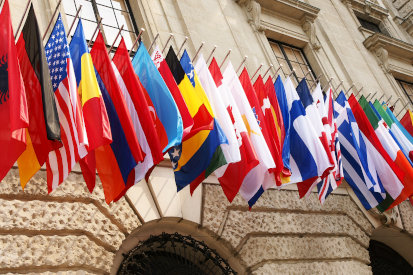The Extradition Act 1988 (Cth) provides Australia’s legislative basis for extradition, setting out several mandatory requirements which must be met before Australia can make or accept an extradition request. These may be supplemented by requirements contained in a multilateral or bilateral treaty.
While a bilateral treaty is an agreement between two countries, a multilateral treaty refers to extradition arrangements between multiple countries. For example, the OECD anti-bribery convention has 44 signatories – all 37 OECD countries (including Australia) plus Argentina, Brazil, Bulgaria, Costa Rica, Peru, Russia, and South Africa.
The Australian government outlines Australia’s multilateral extradition arrangements, and the corresponding Australian legislation which implements the arrangements into domestic laws.
Australia’s multilateral extradition arrangements
| Name of Arrangement | Act or regulations which implement the Arrangement |
| Convention for the Suppression of Unlawful Seizure of Aircraft (Hague Convention)
Convention for the Suppression of Unlawful Acts against the Safety of Civil Aviation (Montreal Convention) Protocol for the Suppression of Unlawful Acts of Violence at Airports Serving International Civil Aviation |
Extradition (Aviation) Regulations 1994 |
| Convention on Combating Bribery of Foreign Public Officials in International Business Transactions (OECD Anti-Bribery Convention) | Extradition (Bribery of Foreign Public Officials) Regulations 1999 |
| International Convention for the Suppression of Acts of Nuclear Terrorism | Extradition (Convention for Suppression of Acts of Nuclear Terrorism) Regulations 2012 |
| United Nations Convention against Corruption | Extradition (Convention against Corruption) Regulations 2005 |
| International Convention for the Suppression of Counterfeiting Currency and the protocol to that Convention | Extradition (Currency) Regulations 2008 |
| Council of Europe Convention on Cybercrime (Budapest Convention) | Extradition (Cybercrime) Regulations 2013 |
| International Convention Against the Taking of Hostages | Extradition (Hostages) Regulations 2009 |
| Convention on the Prevention and Punishment of Crimes against Internationally Protected Persons, including Diplomatic Agents | Extradition (Internationally Protected Persons) Regulations 2009 |
| Single Convention on Narcotic Drugs, 1961, and Protocol to that Convention | Extradition (Narcotic Drugs) Regulations 2009 |
| Optional Protocol to the Convention on the Rights of the Child on the Sale of Children, Child Prostitution and Child Pornography | Extradition (Optional Protocol to the Convention on the Rights of the Child on the Sale of Children, Child Prostitution and Child Pornography) Regulations 2006 |
| Convention on the Physical Protection of Nuclear Material | Extradition (Physical Protection of Nuclear Material) Regulations 1988 |
| Regional Cooperation Agreement on Combating Piracy and Armed Robbery against Ships in Asia | Extradition (Piracy against Ships in Asia) Regulations 2013 |
| Convention on the Safety of United Nations and Associated Personnel | Extradition (Safety of United Nations and Associated Personnel) Regulations 2000 |
| Convention for the Suppression of Unlawful Acts against the Safety of Maritime Navigation
Protocol for the Suppression of Unlawful Acts against the Safety of Fixed Platforms Located on the Continental Shelf |
Extradition (Ships and Fixed Platforms) Regulations 2009 |
| International Convention for the Suppression of the Financing of Terrorism | Extradition (Suppression of the Financing of Terrorism) Regulations 2006 |
| International Convention for the Suppression of Terrorist Bombings | Extradition (Suppression of Terrorist Bombings) Regulations 2002 |
| Convention against Torture and Other Cruel, Inhumane or Degrading Treatment or Punishment | Extradition (Torture) Regulations 2009 |
| United Nations Convention against Illicit Traffic in Narcotic Drugs and Psychotropic Substances | Extradition (Traffic in Narcotic Drugs and Psychotropic Substances) Regulations 2009 |
| United Nations Convention against Transnational Organised Crime (Palermo Convention)
Protocol against the Smuggling of Migrants by Land, sea and Air, supplementing the United Nations Convention against Transnational Organized Crime done at New York Protocol to Prevent, Suppress and Punish Trafficking in Persons, especially Women and Children, supplementing the United Nations Convention against Transnational Organized Crime done at New York on 15 November 2000 |
Extradition (Transnational Organised Crime) Regulations 2004 |
| UN Security Council resolution 827 establishing The International Criminal Tribunal for the former Yugoslavia
UN Security Council resolution 955 establishing the International Criminal Tribunal for Rwanda |
International War Crimes Tribunals Act 1995 |
| Rome Statute of the International Criminal Court | International Criminal Court Act 2002 |
What happens in cases where no treaty exists?
The Australian government states that “Australia can make an extradition request to any country. However, in the absence of a treaty, whether the request will be accepted depends on the domestic laws of that country.”
In addition to bilateral and multilateral treaties, Australia also has non-treaty arrangements with particular countries, as outlined in the links below:



